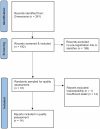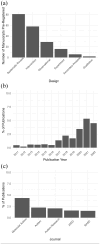A systematic review of pre-registration in autism research journals
- PMID: 39720839
- PMCID: PMC12089682
- DOI: 10.1177/13623613241308312
A systematic review of pre-registration in autism research journals
Abstract
Pre-registration refers to the practice of researchers preparing a time-stamped document describing the plans for a study. This open research tool is used to improve transparency, so that readers can evaluate the extent to which the researcher adhered to their original plans and tested their theory appropriately. In the current study, we conducted an audit of pre-registration in autism research through a review of manuscripts published across six autism research journals between 2011 and 2022. We found that 192 publications were pre-registered, approximately 2.23% of publications in autism journals during this time frame. We also conducted a quality assessment of a sample of the pre-registrations, finding that specificity in the pre-registrations was low, particularly in the design and analysis components of the pre-registration. In addition, only 28% of sampled manuscripts adhered to their analysis plan or transparently disclosed all deviations. Autism researchers conducting confirmatory, quantitative research should consider pre-registering their work, reporting any changes in plans transparently in the published manuscript. We outline recommendations for researchers and journals to improve the transparency and robustness of the field.Lay abstractWhen researchers write down their plans for a study ahead of time and make this public, this is called pre-registration. Pre-registration allows others to see if the researchers stuck to their original plan or changed as they went along. Pre-registration is growing in popularity but we do not know how widely it is used in autism research. In this study, we looked at papers published in six major autism journals between 2011 and 2022. We found that only 2.23% of papers published in autism journals had been pre-registered. We also took a close look at a selection of the pre-registrations to check how good they were and if researchers stuck to their plans. We found that the pre-registrations generally lacked specifics, particularly about how the study was designed and the data would be analysed. We also found that only 28% of the papers closely followed the pre-registered plans or reported the changes.Based on these findings, we recommend that autism researchers consider pre-registering their work and transparently report any changes from their original plans. We have provided some recommendations for researchers and journals on how pre-registration could be better used in autism research.
Keywords: autism; autism research; meta-research; pre-registration.
Conflict of interest statement
Declaration of conflicting interestsThe author(s) declared no potential conflicts of interest with respect to the research, authorship and/or publication of this article.
Figures





Similar articles
-
Adapting Safety Plans for Autistic Adults with Involvement from the Autism Community.Autism Adulthood. 2025 May 28;7(3):293-302. doi: 10.1089/aut.2023.0124. eCollection 2025 Jun. Autism Adulthood. 2025. PMID: 40539213
-
Do peer reviewers comment on reporting items as instructed by the journal? A secondary analysis of two randomized trials.J Clin Epidemiol. 2025 Jul;183:111818. doi: 10.1016/j.jclinepi.2025.111818. Epub 2025 May 8. J Clin Epidemiol. 2025. PMID: 40348145
-
"I Don't Understand Their Sense of Belonging": Exploring How Nonbinary Autistic Adults Experience Gender.Autism Adulthood. 2024 Dec 2;6(4):462-473. doi: 10.1089/aut.2023.0071. eCollection 2024 Dec. Autism Adulthood. 2024. PMID: 40018066
-
The Lived Experience of Autistic Adults in Employment: A Systematic Search and Synthesis.Autism Adulthood. 2024 Dec 2;6(4):495-509. doi: 10.1089/aut.2022.0114. eCollection 2024 Dec. Autism Adulthood. 2024. PMID: 40018061 Review.
-
How lived experiences of illness trajectories, burdens of treatment, and social inequalities shape service user and caregiver participation in health and social care: a theory-informed qualitative evidence synthesis.Health Soc Care Deliv Res. 2025 Jun;13(24):1-120. doi: 10.3310/HGTQ8159. Health Soc Care Deliv Res. 2025. PMID: 40548558
References
-
- Begley C. G., Ellis L. M. (2012). Raise standards for preclinical cancer research. Nature, 483(7391), 531–533. - PubMed
-
- Bochynska A., Keeble L., Halfacre C., Casillas J. V., Champagne I. A., Chen K., Roettger T. (2023). Reproducible research practices and transparency across linguistics. Glossa Psycholinguistics, 2(1).
-
- Bölte S. (2014). The power of words: Is qualitative research as important as quantitative research in the study of autism? Autism, 18(2), 67–68. - PubMed
Publication types
MeSH terms
LinkOut - more resources
Full Text Sources

